Scientists develop terahertz transmitter capable of sending data 10 times faster than 5G
Scientists from Japan have developed terahertz (THz) transmitter technology, a next generation system which can transmit digital data over 10 times faster than 5G mobile networks.
It will pave transmitting digital data at a rate exceeding 100 gigabits per second (gbps) over a single channel using the 300-gigahertz band.
Key Facts
- The THz band is a new and vast frequency resource expected to be used for future ultrahigh-speed wireless communications.
- The THz transmitter achieves a communication speed of 105 gigabits per second using the frequency range from 290 GHz to 315 GHz.
- These range of frequencies are currently unallocated but fall within the frequency range from 275 GHz to 450 GHz. It paves way for faster downloads and improve in-flight network connection speeds.
- Terahertz wireless is high-data-rate minimum-latency communications. Its possible applications include fast download from contents servers to mobile devices and ultrafast wireless links between base stations.
- In 2016, scientists had demonstrated that the speed of a wireless link in the 300-GHz band can be greatly enhanced by using quadrature amplitude modulation (QAM).
- Later in 2017 they showed six times higher per-channel data rate, exceeding 100 gbps for the first time as an integrated-circuit-based transmitter.
Month: Current Affairs - February, 2017


